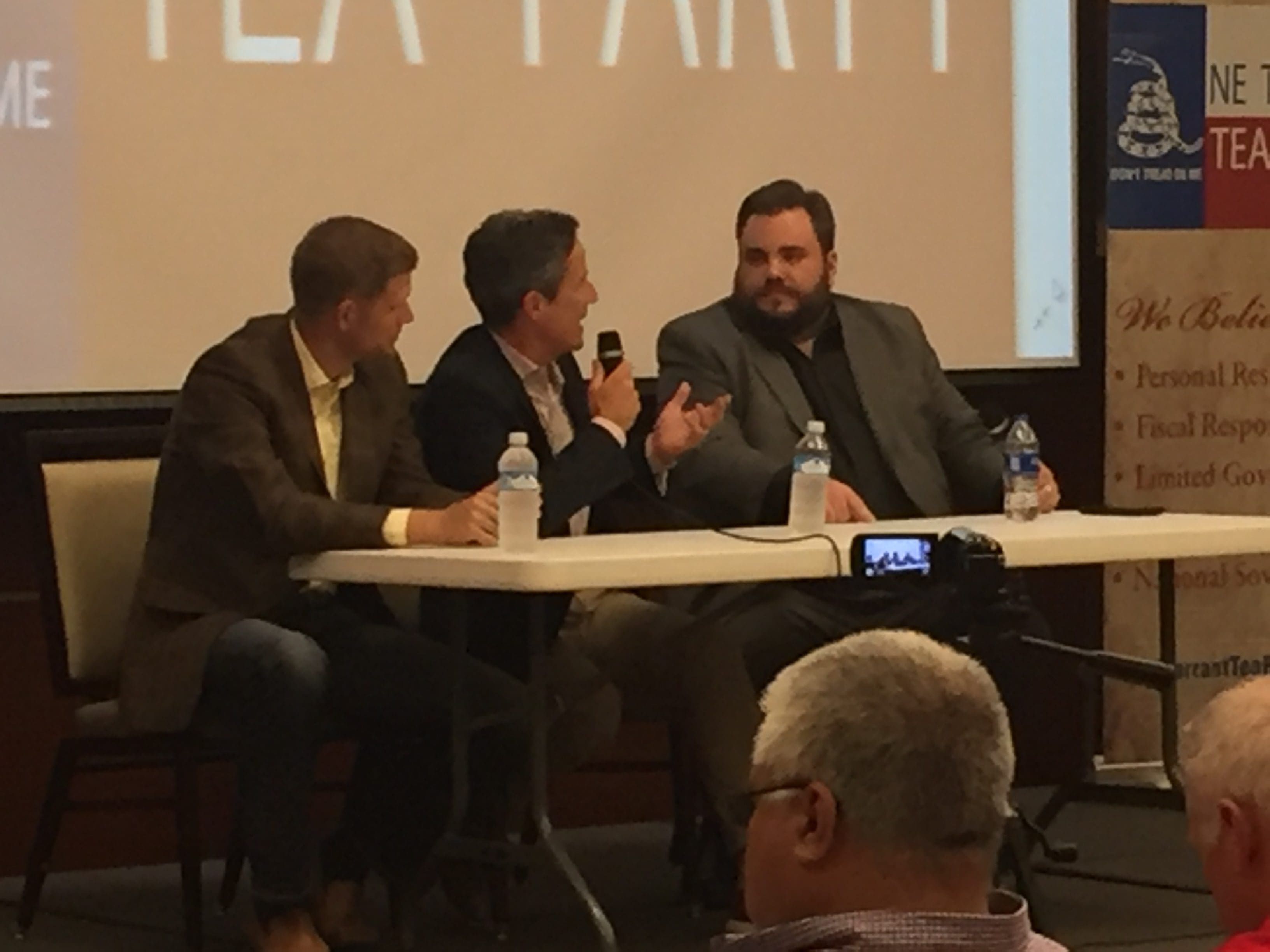A forum hosted by the Northeast Tarrant Tea Party turned into a debate Monday night as local lawmakers disagreed over the critical issues of property tax reform and school funding addressed in the 2019 Texas Legislative Session.
The panel of lawmakers featured State Rep. Jonathan Stickland (R–Bedford), State Rep. Matt Krause (R–Haslet), and State Sen. Kelly Hancock (R–North Richland Hills).
Possibly anticipating disagreement, Stickland started by affirming he held no personal animus toward any of his fellow panelists.
“If you hear disagreement tonight, I want to be very clear: that doesn’t mean I don’t have love for the two folks up here,” Stickland said.
The panel quickly devolved into a debate as Hancock and Stickland sparred over House Bill 3, a massive education spending spree that also provided $5 billion in property tax relief. Stickland argued the bill and session were “disappointing,” with not enough accomplished for property tax relief and too much spent rewarding “bad actors” in the school finance bill.
“I’m not okay with sacrificing everything we have to do, and asking you to sacrifice everything that you do, for the results that we just got,” Stickland said. “I think we turn Texas blue faster by running away from our base and giving our people no real hope and results faster than what we have done.”
Hancock shot back at Stickland, arguing the $5 billion for property tax relief and the monies spent for flood relief were part of the reason for increased spending.
“Jonathan, I know you didn’t support the school finance bill because it didn’t help out Hurst-Euless-Bedford, your school district,” Hancock said.
“That was one of the reasons, but that wasn’t the only reason,” Stickland interjected. He said it wasn’t fair to his district to get only a “$200 increase per kid, per year,” but poor-performing Fort Worth ISD gets $1,300 per student.
Stickland also expressed frustration about the bill’s original approach to property tax relief, arguing that it was an “afterthought” and the original $2.7 billion appropriated for relief wasn’t enough. He acknowledged the current $5 billion isn’t enough either, but “the ball moved to the right.”
On top of that, Stickland claimed there wasn’t enough will in the legislature to significantly address Robin Hood recapture, the socialist wealth redistribution scheme that currently governs public school funding in the state. Hancock immediately took issue with Stickland’s statements.
“It’s difficult to say we spent too much money and then say we didn’t address Robin Hood,” Hancock said, arguing that to do even more would have cost an additional $10 billion. “How much more money did you want us to spend as a state?”
Hancock warned the state will have to spend more money on education now with the newly passed 2.5 percent school property tax cap, but with Robin Hood still in place, as long as the economy continues growing, recapture will continue to decline over time.
“It’s a math problem you can’t fix in one session,” Hancock said.
Stickland wasn’t convinced. He maintained the legislature could have done more and refocused the increased funding for schools, to reward good performers and not bad ones.
“You could have bought down a significant more amount of money of people who are taxed at the max tax rate, and their money is being taken and redistributed, in this case, to failing communities,” Stickland argued.
“Is there proof that throwing more money at them is going to teach them to read?” NETTP President Julie McCarty asked Hancock at one point.
“That’s why it’s a 300-page bill,” Hancock replied, saying the education system has now been overhauled to reward performance, not tenure, following the successful Dallas Independent School District model.
Stickland did agree that there were reforms in HB 3 that he believed were positive.
“We have completely changed the way we’re going to do education in the state of Texas,” he said.
“I know everybody’s frustrated on property tax, I get it,” Krause added, with shouts from the audience. “It’s partly our fault. I think we need to take the blame because we talked about going into session [delivering] property tax relief.” He went on to say that the people cannot rely on Austin to deliver property tax relief but instead must get more plugged into their local governments. Krause himself voted for the spending sprees in the new state budget.
Hancock was also asked about his work supporting the controversial mental health consortium bill, and what would happen if parents refuse to give permission for their child to receive psychiatric or specialized school services. He said that, while they were working to maintain parental rights, “we don’t allow parental protection of somebody who could do harm to others.”
Other questions were asked throughout the night about the session and missed opportunities, but the audience clearly favored Stickland, who argued that a “purple session” was not the way to keep Texas red.
“We need to understand that the grassroots are the only ones who are going to be able to change this state,” he said. “We’ve got to figure out how to be louder and prouder.”
Hancock argued strongly for continued Republican unity in order to maintain their hold on the state.
“Redistricting is coming, and we need to be prepared for it,” Hancock said. “Hurst-Euless-Bedford shouldn’t win by 49 percent,” he said in reference to Stickland’s 2018 re-election.
Krause closed by encouraging the grassroots to hold their elected officials accountable; to continue an open dialogue with them, letting them know when they’re right and wrong; and to get involved at the local level. “You’ve got to stay active. You’ve got to stay engaged.”





